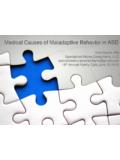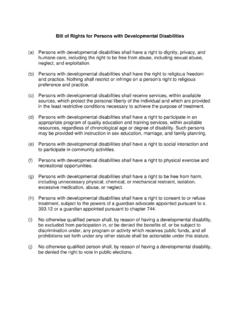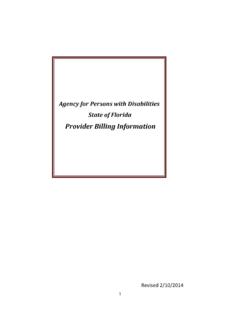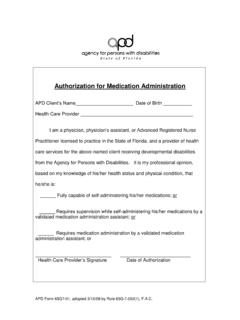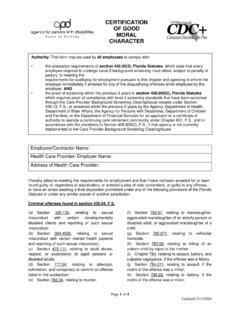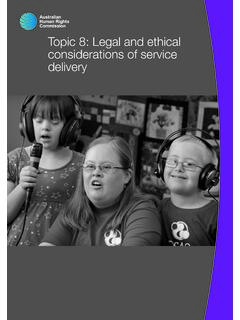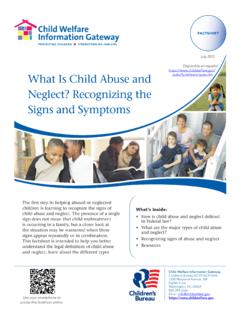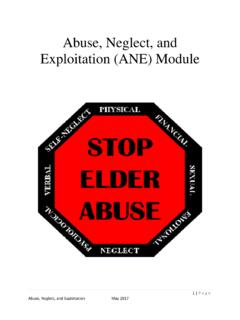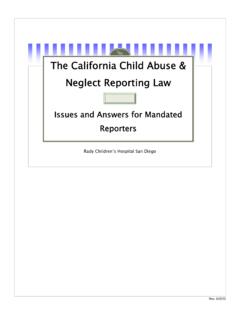Transcription of TRAIN Florida APD Zero Tolerance Learner Guide Module 1
1 Rev.: 1/21/2020 TRAIN Florida APD Zero Tolerance Learner Guide Module 1 The Agency Supports Persons with Developmental Disabilities in Living, Learning, and Working in their Communities. Zero Tolerance Learner Guide Module 1 Rev.: 1/21/2020 This Page Left Blank Intentionally Zero Tolerance Learner Guide Module 1 Rev.: 1/21/2020 Table of Contents- Module 1 Slide No.: Slide Title Page Slide 1 Zero Tolerance 1 Slide 2 Module 1- Defining abuse , neglect and exploitation of People with Developmental Disabilities 1 Slide 3 A Day in the Life 1-2 Slide 4 My name is Shelia 2 Slide 5 Purpose of training 3 Slide 6 Course Objectives 3 Slide 7 Course Objectives 3 Slide 8 Course Objectives 4 Slide 9 Audience and Length of Time 4 Slide 10 Course Overview 4 Slide 11 Module 1 Learning Objectives 5 Slide 12 Who is a Caregiver? 5 Slide 13 caregivers 5 Slide 14 Caregiver Tasks 6 Slide 15 Caregiver Tasks 6 Slide 16 Legal Definitions 6 Slide 17 Types of Caregiver abuse 7 Slide 18 Laws Regarding Types of abuse 7 Slide 19 Laws Regarding Types of abuse 8 Slide 20 Sexual Misconduct 8 Slide 21 Sexual Misconduct 9 Slide 22 Sexual Activity 9 Slide 23 Summary 10 Slide 24 Activity #1 10 Slide 25 Next Module 10 Zero Tolerance Learner Guide Module 1 Rev.
2 : 1/21/2020 The pictures tell stories. These stories existed in Texas, and were provided courtesy of Disability Services ASAP (A Safety Awareness Program). Unfortunately, they are not unique to Texas and are just as likely to happen in Florida . We hope you learn in this course how to recognize abuse , neglect , and exploitation , as well as how and where to report it so that these types of incidents can be prevented. Slide 1 - Welcome to Zero Tolerance Slide 2 - Module 1 - Defining abuse , neglect , and exploitation of People with Developmental Disabilities Slide 3- A Day in the Life The state of Florida requires this course for staff who work with individuals with developmental disabilities as a statewide initiative to prevent abuse , neglect , and exploitation of those individuals. In this Module , you will learn what actions are defined as abuse , neglect , and exploitation . You will also learn about some reasons why caregivers mistreat those individuals in their care.
3 Zero Tolerance Learner Guide Module 1 Rev.: 1/21/2020 My name is Shelia, my picture is on the right and I have cerebral palsy. I have some movement in my arms but cannot speak. My mother helps me get dressed every day. However, when she helps me out of bed in the morning, she pulls me by my arms with extreme force. She bathes me in HOT water and washes my hair with her nails to the point that it brings tears to my eyes every day. She also lets shampoo run into my eyes. At mealtime, she helps me eat, but she feeds me the same cold apricot baby food for every meal. She never really pays attention and stuffs too much in my mouth before I have a chance to swallow the last few bites, sometimes causing me to cough and choke. My mom scares me and I do not know what to say or whom to tell because she is my mom. My name is Kristen, my picture is on the right, and I have an intellectual disability. I am nonverbal and live in a group home. Since I am the resident who has lived there the longest, I do not have a roommate.
4 One of the house rules is lights out by 10:00 Most of the other residents are asleep by 10:30 On occasion, one of the staff members comes into my room around 11:30 and forces me to touch him sexually and he touches me sexually. He tells me he chose me because I am the prettiest and nicest resident, and that I am special and it is an honor to have him come into my room. He tells me that he is helping me experience sexual pleasure that I would not experience without him. However, to not hurt the other residents feelings, he tells me not to tell anyone. If I do, he says he will deny it all and come in the night and hurt me. What he says makes sense and I guess I should thank him, but I cannot figure out why I do not feel good about the situation. I wait in fear every night in the dark. Slide 3- A Day in the Life- continued Slide 4 - My name is Shelia Zero Tolerance Learner Guide Module 1 Rev.: 1/21/2020 By the end of this Zero Tolerance course, you will be able to: 1.
5 Define caregiver. 2. Define the five general types of caregiver abuse . 3. Describe the reasons why individuals with developmental disabilities are more likely to be abused, neglected, or exploited. 4. Explain how power and control contribute to caregiver abuse . 5. List statistics related to the abuse , neglect , and exploitation of individuals with developmental disabilities. You will also be able to: 6. List who should report abuse , neglect , and exploitation . 7. Describe strategies to apply when assessing an individual for abuse , neglect , and exploitation . 8. Explain issues to consider when assessing an individual for abuse , neglect , and exploitation . 9. List indicators of abuse , neglect , and exploitation . Slide 5 - Purpose of training Slide 6 -Course Objectives Slide 7 -Course Objectives The purpose of the Zero Tolerance training is to teach direct care providers, support coordinators, and any individual providing care or support to an APD consumer (on behalf of the agency or its providers) about abuse , neglect and exploitation of individuals with developmental disabilities.
6 This course will provide information about how often and why these types of crimes happen and also describe how and why these crimes occur. This training will provide the tools needed to identify potentially dangerous situations and explain how to report that information. You will also find out about ways you can prevent abuse , neglect , and exploitation . Zero Tolerance Learner Guide Module 1 Rev.: 1/21/2020 Slide 8 Course Objectives Slide 9 Audience and Length of Time Slide 10 Course Overview You will also be able to: 10. Explain how to report abuse , neglect , or exploitation . 11. Identify common barriers to reporting abuse , neglect , and exploitation . 12. Explain procedures for investigating reported abuse . 13. Describe methods which can be used to prevent, abuse , neglect , and exploitation . 14. Describe how to create and maintain a safe living environment for individuals with developmental disabilities. The Audience for this course is intended to be direct care providers and support coordinators and any individual providing care or support to an APD consumer on behalf of the agency or its providers.
7 The Length of Time for the Zero Tolerance course is estimated to be five hours. This course is divided into four modules. Course Overview: The Zero Tolerance Participant's Guide is organized into the following modules and will be used along with this course: Module 1: Defining abuse , neglect , and exploitation of People with Developmental Disabilities. Module 2: Recognizing the Signs and Symptoms. Module 3: Reporting to the abuse Hotline. Module 4: Prevention and Safety Planning. Zero Tolerance Learner Guide Module 1 Rev.: 1/21/2020 caregivers are family members such as a parent, spouse, sibling, child as well as, close friends, volunteers, and neighbors. caregivers who may be paid and involved in an individual s care include; support coordinators, homemakers, transportation drivers, doctors, nurses and teachers or teacher s aides. Turn to page 12 in the Participant's Guide for more information about caregivers . Slide 11 Module 1-Learning Objectives Slide 12 - Who is a caregiver?
8 Slide 13 - caregivers We are now ready to start Module 1. At the end of this Module , you should be able to: Define caregiver. Define the five general types of caregiver abuse . Describe the reasons why individuals with developmental disabilities are more likely to be abused, neglected, or exploited. A caregiver is anyone who provides assistance for daily living to an individual with developmental disabilities. Examples of a caregiver might be either a paid personal assistant, or an individual who provides care for no pay. Turn to page 11 in the Participant's Guide and take a few minutes to write down the types of individuals who may provide care to individuals with developmental disabilities. Also, write some of the personal care tasks that caregivers might provide. Zero Tolerance Learner Guide Module 1 Rev.: 1/21/2020 Other examples of caregiver tasks are: Cleaning Running errands Paying bills Providing Transportation, and Giving medications Turn to page 13 in the Participant's Guide .
9 Slide 14 -Caregiver Tasks Slide 15 Caregiver Tasks Slide 16 - Legal Definitions caregivers provide assistance with personal care tasks that include: Bathing Dressing Toileting Transferring or Moving the individual Assisting to Eat Cooking The legal definitions under Florida law define caregiver in two different ways. One definition of caregiver applies to those individuals who are responsible for caring for children. The other definition applies to caregivers of adults with developmental disabilities, who are referred to as vulnerable adults in Florida law. Turn to page 14 in your Participant's Guide for the legal definition. Zero Tolerance Learner Guide Module 1 Rev.: 1/21/2020 Types of Caregiver abuse Caregiver abuse is the exertion of the caregiver s will over the person with a disability. Caregiver abuse usually falls into one of five categories. When abuse is present, these categories of abuse frequently overlap.
10 There are five general types of caregiver abuse and some examples are provided: Physical- hitting, pushing, hair pulling, kicking, biting Sexual-verbal harassment; unwanted sexual touching of private parts; forced abortion, sterilization or pregnancy Emotional and/or Verbal-verbal abuse focused on impairment; denial of right to make decisions; Financial exploitation -denial of access to or control of funds; misusing financial resources; neglect /Self- neglect -denial of food, clothing, shelter or transportation; not working assigned hours or not performing duties; You can find more examples for each of the types of caregiver abuse on page 16 in your Participant's Guide . Laws Regarding Types of abuse Not only is Florida law separated into types of abuse , but it is further categorized to distinguish between issues such as abandonment, abuse , and neglect of children, and exploitation , abuse , and neglect of adults with developmental disabilities. Florida law is separated into these types of abuse : Child Abandonment Child abuse Child neglect exploitation of an Adult with a Developmental Disability Slide 17 Types of Caregiver abuse Slide 18 - Laws Regarding Types of abuse Zero Tolerance Learner Guide Module 1 Rev.
